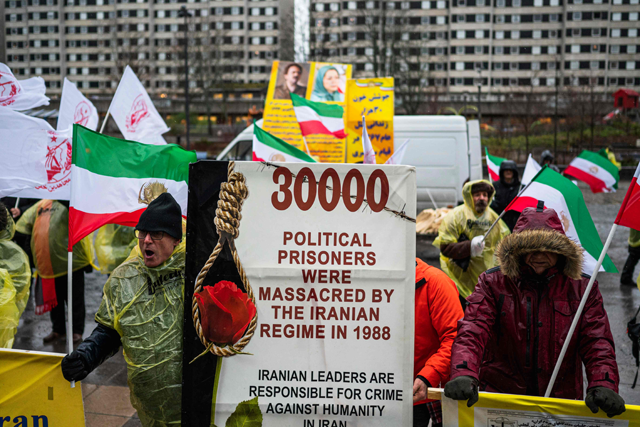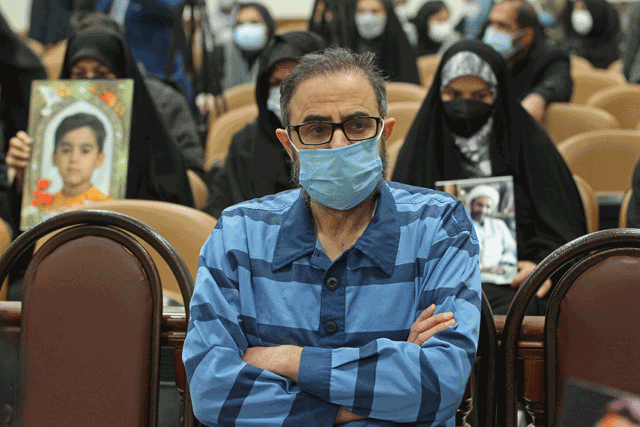You are here
Swedish court confirms life sentence for Iran ex-prison official
By AFP - Dec 20,2023 - Last updated at Dec 20,2023

Protesters shout slogans, wave flags and display banners and placards outside the Appeals Court building in Sollentuna, north of Stockholm, Sweden on January 11 (AFP photo)
STOCKHOLM — A Swedish appeals court on Tuesday confirmed the conviction of a former Iranian prison official handed a life sentence for crimes committed during a 1988 purge of dissidents.
The verdict could have repercussions on the fate of Swedish prisoners in Iran, including EU diplomat Johan Floderus who has been held for more than 600 days.
The Svea Court of Appeal said in a statement it “affirmed the judgement... in significant parts” of 62-year-old Hamid Noury, who in July 2022 was given a life sentence “for grave breaches of international humanitarian law and murder”.
“Our assessment is that the prosecutor’s case is robust and overall compelling and that the district court was correct to find the prosecutors charges largely substantiated,” Judge Robert Green said.
Noury was arrested at a Stockholm airport in November 2019 after Iranian dissidents in Sweden filed police complaints against him.
The case relates to the killing of at least 5,000 prisoners across Iran, allegedly ordered by supreme leader Ayatollah Khomeini, to avenge attacks carried out by exiled opposition group the People’s Mujahedin of Iran (MEK) at the end of the Iran-Iraq war of 1980-88.
Sweden has tried Noury under its principle of universal jurisdiction, which allows it to try a case regardless of where the offences took place.
The district court found that Noury had been an assistant to a prosecutor in a prison near Tehran at the time of the events and had “retrieved prisoners, brought them to the committee and escorted them to the execution site”.
Noury’s defence lawyers had asked the appeals court to acquit him or reduce his sentence.
Strained relations
The lower court trial was the first related to the mass executions in Iran in the 1980s.
It was particularly sensitive, as rights activists accuse senior Iranian officials now in power — including current President Ebrahim Raisi — of having been members of the committees that handed down the death sentences.
Noury’s arrest and sentencing has strained relations between Sweden and Iran.
As Noury’s lower court trial was underway in Stockholm in April 2022, Iran arrested Johan Floderus, a Swede working for the EU’s diplomatic service, as he was returning from a trip to Iran with friends.
Floderus’s trial opened in Iran earlier this month, with Tehran accusing the 33-year-old of conspiring with Iran’s arch-enemy Israel and of “Corruption on Earth” — one of Iran’s most serious offences which carries a maximum penalty of death.
Ahmadreza Djalali, an Iranian-Swedish academic, is also imprisoned and under threat of execution after he was arrested in Iran in 2016 and sentenced to death on espionage charges.
Iran has previously used detained foreign nationals as bargaining chips to secure the release of its citizens or frozen funds held abroad, including with the United States and Belgium.
Prisoner swap?
Swedish media have speculated about the possibility of a prisoner swap between Sweden and Iran.
Mark Klamberg, a professor of international law and senior non-resident fellow at the Atlantic Council think tank, stressed that Tuesday’s verdict would likely be appealed to Sweden’s supreme court and any potential deal would need to await a final ruling.
Klamberg said a prisoner swap could be done two ways.
“The government could pardon Noury... But I don’t think that will happen, it’s politically impossible,” Klamberg told AFP.
More likely, provided Stockholm would want a swap, would be for Sweden and Iran to agree that Noury must serve the rest of his sentence in Iran — which in practice would likely mean that he would be a free man once he returned.
However, Klamberg noted that political considerations would then come into play.
For instance, agreeing could encourage Iran to continue its policy of taking foreigners as hostages to use as bargaining chips, he said.
Another aspect was the reason for putting Noury on trial in the first place.
Klamberg said that for some victims it was important that Noury serve his sentence, while for others it may be just as important the Swedish court actually established in an authoritative manner what happened in the 1980s, a judgement which is unique in itself.
“I think an important aspect for the Swedish government is how [a prisoner swap] would be received by the victims,” Klamberg said.
Swedish Foreign Minister Tobias Billstrom has declined to comment on the possibility of a prisoner swap.
Related Articles
STOCKHOLM — A Swedish court on Thursday handed a life sentence to former Iranian prison official Hamid Noury for crimes committed during a 1
CADIZ, Spain — The European Union's top diplomat confirmed on Tuesday that Johan Floderus, a Swedish diplomat working for the EU, has been h
TEHRAN — Iran on Saturday hanged Swedish-Iranian dissident Habib Chaab for “terrorism”, drawing condemnation from Sweden, in the Islamic rep












